- News
- Reviews
- Bikes
- Accessories
- Accessories - misc
- Computer mounts
- Bags
- Bar ends
- Bike bags & cases
- Bottle cages
- Bottles
- Cameras
- Car racks
- Child seats
- Computers
- Glasses
- GPS units
- Helmets
- Lights - front
- Lights - rear
- Lights - sets
- Locks
- Mirrors
- Mudguards
- Racks
- Pumps & CO2 inflators
- Puncture kits
- Reflectives
- Smart watches
- Stands and racks
- Trailers
- Clothing
- Components
- Bar tape & grips
- Bottom brackets
- Brake & gear cables
- Brake & STI levers
- Brake pads & spares
- Brakes
- Cassettes & freewheels
- Chains
- Chainsets & chainrings
- Derailleurs - front
- Derailleurs - rear
- Forks
- Gear levers & shifters
- Groupsets
- Handlebars & extensions
- Headsets
- Hubs
- Inner tubes
- Pedals
- Quick releases & skewers
- Saddles
- Seatposts
- Stems
- Wheels
- Tyres
- Health, fitness and nutrition
- Tools and workshop
- Miscellaneous
- Tubeless valves
- Buyers Guides
- Features
- Forum
- Recommends
- Podcast
news
"Concerning" road safety picture as motorists unsure of Highway Code changes to protect pedestrians and cyclists; Is a mid-ride wee actually littering?; Close pass advert turns into whataboutery; Moto madness at pro race + more on the live blog
SUMMARY
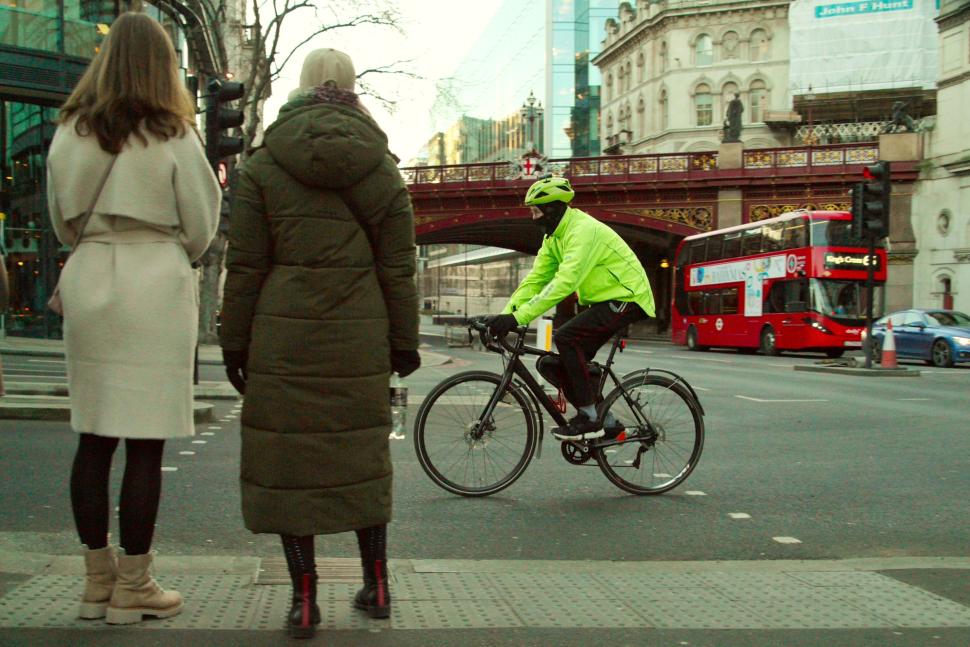 Cyclist in London with pedestrians in foreground - copyright Simon MacMichael
Cyclist in London with pedestrians in foreground - copyright Simon MacMichael29 January 2024, 12:09
More Highway Code news: RAC research suggests half of drivers still unsure if Highway Code changes have made roads any safer for pedestrians
Two years on from the Highway Code changes — brought in to better protect vulnerable road users — more than half of drivers (51 per cent) surveyed by the RAC are still unsure whether the changes have made the roads safer for pedestrians.
Only a fifth (18 per cent) said they believe the new rules have made pedestrians safer, while 31 per cent believe the changes have made things even more dangerous for pedestrians at junctions.
Perhaps the biggest change was the guidance that drivers turning into or out of a junction should give way to pedestrians, cyclists and horse riders who are crossing or waiting to cross (as demonstrated in the image at the top of this post).
Less than a quarter of drivers (23 per cent) surveyed said they always give way to pedestrians when turning in or out of junctions, while nearly half (48 per cent) said they do most of the time. Concerningly, the RAC noted, 19 per cent said they don't stop often while six per cent never do.
The research was focused on pedestrian safety but of motorists with at least 25 years experience, only 13 per cent said they believe pedestrians, cyclists and horse riders are safer now the changes have been implemented.
"It’s concerning to see there's still so much uncertainty, with most drivers not stopping for people crossing when they should and therefore many pedestrians seeing no change to their safety at junctions," RAC road safety spokesperson Rod Dennis said.
"Part of the reason may be that drivers simply don't know that the changes have been made, least of all the consequences of ignoring them. Most drivers probably rarely refer to the Highway Code once they've passed their tests, and that's where the problem could lie.
"We urge motorists to take another close look at the changes – either by visiting the Highway Code or RAC websites, or by picking up a printed copy. We'd also urge the Government to make another concerted effort in communicating the changes to all road users."
29 January 2024, 17:26
Cyclist to sue council after suffering life-changing injuries from hitting a pothole — which is still not fixed after 15 months
29 January 2024, 16:09
Stopped for a mid-ride comfort break? Don't take the piss or urine for a fine, council warns
A council has warned people about peeing in the countryside, adding that anyone caught could be fined for littering. And before anyone accuses us of reporting a pisstake, here's the link to the story in the Guardian today which notes there have been at least two cases of men handed £88 fines for relieving themselves, apparently caught by Dacorum borough council enforcers waiting in lay-bys in Hertfordshire.
District Enforcement, a private company contracted by Dacorum council to issue penalty fines (22 per cent of which goes to the council, the rest to the company), issued the fines on the grounds it amounted to littering.
In an even more bizarre twist, a certain Mr Loophole (of live blog fame for his outspoken views on cycling) has sprung to the public's defence, arguing the interpretation of litter is "contrary to the legislation and it is contrary to its everyday meaning and therefore, in my view, legally, they are wrong".
Be warned next time you nip behind a tree for your mid-ride piss stop. On the plus side, it reminded us of Jo's brilliant piece on the subject... we've all got our favourite spots...
29 January 2024, 14:33
"What kind of disturbed, inhumane individuals do that?": Double hit-and-run suspects were "laughing" after mowing down Melbourne cyclist
29 January 2024, 14:22
Team Visma | Lease a Bike rider's criminal charges dropped over doping case
[Alex Broadway/SWpix.com]
The news coming out of the Dutch press today is that German rider Michel Hessmann, the Team Visma | Lease a Bike who has not raced since testing positive for a banned diuretic last year, will not face criminal charges relating to his doping case.
WielerFlits reports the Freiburg Public Prosecutor's Office has dismissed the case due to no or insufficient suspicion of a criminal offence. This does not mean that he cannot face an anti-doping suspension, just that he will not face criminal charges in Germany, where doping is a criminal offence.
29 January 2024, 12:58
Cyclists bemoan missing bollards and poor layout as footage shows motorist driving down a cycle lane
29 January 2024, 12:36
Pro cycling is definitely back (Part 2 and 3)
Further to the near miss motorbike rider at yesterday's Trofeo Palma we mentioned earlier, you know pro cycling is back when...
Someone gets the finish line wrong...
Trofeo Palma, with two laps to go. Was that you, Emil Herzog? 👀 just practice for the next race, eh? 😉 pic.twitter.com/KW4eeVUX1L
— Reno (@renovandael) January 28, 2024
Two laps to go on that one. Oh, you also know pro cycling is back when... Geraint Thomas is out sharing snaps of the (not) Welsh countryside...
Lovely Sunday spin up the Tumble 🌋 👍 pic.twitter.com/6756mjwjIv
— Geraint Thomas (@GeraintThomas86) January 28, 2024
Yep, that joke is going to keep rolling into 2024...
29 January 2024, 11:32
Highway Code: Police force's close pass advert met with usual anti-cycling comments
Police Scotland shared this advert on Facebook over the weekend, raising awareness of the Highway Code and the need for motorists to give "at least 1.5m when overtaking people on bikes at speeds up to 30mph, and give more space at higher speeds"...
It's a familiar concept for a campaign promoting behaviour that will have a positive impact on cyclist safety — humanising people who use bikes as family, friends, partners of others, not just 'CYCLISTS'.
Simple enough, we'd say. Please make sure you do this small thing while driving a vehicle to ensure the safety of a more vulnerable road user who, like you, is a daughter/son/mother/father/sister/brother/wife/husband/girlfriend/boyfriend... seems fair enough to us. Apparently not, according to Police Scotland's comments section.
"It's not that when the bikers are squeezing in and out all the cars at lights to get by, they don't keep ther distance then! So why should we!!!!"
"When will you draw attention to cyclists who frequently disobey the Road Traffic Act, by non-compliance of red lights, one-way streets, and pavement violations."
Interesting mention of pavement violations on the day Edinburgh City Council begins enforcing a ban on pavement parking with £100 fines. Some more from the comments...
"Cyclists are a menace should pay road tax or some sort of payment to be on the road."
"Agreed, however the focus is always on the driver of the car but we all know the road (and pavement) behaviour of cyclists is appalling. Police Scotland need to start focusing on the cyclists and not always look to the driver as the problem. Oh and tell them to put lights on and stop queue jumping by going onto pavements then back onto the road and holding up traffic ..."
Fair play to road.cc reader Craig Robertson who attempted a quick explainer...
"Cyclists v Cars
"Are you about to comment on this post suggesting cyclists shouldn't be allowed on the road? If so, read this handy hints guide first. It'll save you tiring your fingers frantically bashing the keyboard in some kind of fact-devoid, blind rage.
"1. If your argument is centred around car drivers having a licence and cyclists not, realise that the vast majority of cyclists are also car drivers. Being a cyclist does not suddenly preclude you from owning or driving a car. Ergo, most cyclists also have a licence to be on the road.
"2. If you argument is about car drivers paying road tax to allow them to use the road, realise that 'road tax' does not exist. You pay Vehicle Excise Duty (VED). This is based on engine power and emissions. Cyclists have neither engine power nor emissions, so even if they were to be taxed, it would be in the lowest rate tax band. Yes, £0. And since it would cost money to administer this, that cost would be added to your tax bill. That's right, the road upkeep is paid for by your council tax. And cyclists, since they too live in houses, also pay council tax.
"At this juncture you may also wish to circle back to point 1 - most cyclists are also car drivers, so even if you don't believe that VED is for emissions, then you still have to accept that cyclists who own cars also pay VED, or 'road tax' as you seem to be intent on calling it.
"3. If you wish to argue that cyclists should be insured because 'who's going to pay when they bump into my car and cause damage?' then you should know that being a member of British Cycling (£35/year) brings with it up to £10million of third party liability insurance. Additionally, since we've already established that cyclists live in houses (apartments, flats etc.) they most likely have home contents insurance too. If they do, there is a chance that it includes some cycle cover that may extend to third-party liability. If a cyclist bashes in to your car, that would be a good start point. If they have a valuable bike, then they probably have specialist insurance too and that very likely includes third-party liability.
"4. If you think it's wrong for cyclists to ride two-abreast, please reacquaint yourself with the Highway Code. Specifically Rule 66 (handily copied here: 'never ride more than two-abreast, and ride in single file on narrow or busy roads and when riding round bends') so two-abreast is acceptable on normal roads. Rule 67 is also a good one 'look well ahead for obstructions in the road, such as drains, pot-holes and parked vehicles so that you do not have to swerve suddenly to avoid them. Leave plenty of room when passing parked vehicles and watch out for doors being opened or pedestrians stepping into your path.' This is additionally pointed out in the official TFL advice to cyclists, 'Stay central on narrow roads. Try to ride away from the gutter. If the road is too narrow for vehicles to pass you safely, it might be safer to ride towards the middle of the lane to prevent dangerous overtaking by other vehicles'.
"5. If your argument is about cyclists riding badly — well, yes you're right, some do. They give the rest of us a bad name. Just like not all drivers are bad, just some of them. Unfortunately, a bad cyclist might slightly damage a car or get themselves killed. A bad car driver will kill other people, specifically vulnerable road users, like cyclists.
"The crux of this is simple — drivers, motorcyclists and cyclists all have a right to use the road safely. Those that do not adhere to the rules and those that drive or ride unsafely should be brought to task."
29 January 2024, 10:15
Weekend round-up: "Unjustified" legal threats; A gravel bike with mountain bike tyres; Orange Bikes set to continue + more
Here's what you might have missed this weekend...
Some positive news to kick Saturday off — Orange Bikes is set to continue after acquiring frame manufacturer and "streamlining" business.
In the same week it was revealed that Orange Bikes and its assets had been put up for sale by administrators, who deemed the company "unable to continue trading", the beleaguered mountain bike brand now appears to have been saved from permanent closure, after announcing that it is set to continue after acquiring its frame manufacturing partner.
Also on the news front this weekend...
Our Bike at Bedtime was Dylan Johnson's Felt Breed Carbon — a controversial gravel race bike with... mountain bike tyres...
And from mountain bike tyres to no need for tyres at all...
29 January 2024, 09:02
Peloton narrowly avoids crash when motorbike rider pulls into road centimetres away from oncoming riders
You know pro cycling is back from its winter break when... a bunch of riders are put in danger by some questionable driving from a moto rider following the race. Nope, doesn't look like that's been left in 2023...
Increíble la moto😱#ChallengeMallorca#TrofeuPalma pic.twitter.com/aIBNyMwLoD
— Las Gafas de Soldador (@lasgafasdesolda) January 28, 2024
This was at Trofeo Palma yesterday, the Challenge Mallorca race that gets the peloton over to its favourite sunny training destination (Calpe might have something to say about that) for some early season racing.
Fortunately, no crash in this case, but with riding like that we're saying more by luck than judgement. You can almost hear the: 'You see those mirrors on your bike, pal?' shouts (and some more explicit) from the pros as the moto rider sheepishly heads away to much gesticulating from the Intermarché–Wanty rider leading the peloton at that point.
Gerben Thijssen, also of the team named after a French supermarket and Belgian engineering firm (never change, professional cycling, never change), won the race, ahead of former teammate Alexander Kristoff.
The motorbike riders who lead and follow professional bike races do, on the whole, an incredibly impressive job — keeping riders safe, delivering cameramen to the crucial points for the most important moments, and just generally ensuring the race goes ahead as it's meant to. However, when things go wrong you've got a high-profile, headline-grabbing incident on your hands, last year's Tour de France and Tour de France Femmes punctuated by issues...
A few days later Tour de France hero Thomas Voeckler, working as a pundit for France Télévisions, was suspended from the race after his motorbike rider stalled on the steepest slopes of the Col de la Loze, causing a traffic jam which held up several riders and forced Jonas Vingegaard to stop and briefly unclip.
In the women's race a week later we had this...
I've really enjoyed watching @LeTourFemmes, but in what universe is a motorbike allowed to push a rider out of the way?? Or is it just to let her know the next motor is about to take her out? If you can't pass safely, don't pass. We need better education for some motorbike… pic.twitter.com/w3CkDGv6aX
— Adam Hansen (@HansenAdam) July 26, 2023
It's not just a recent issue, of course. In 2020, then-world champion Julian Alaphilippe's Tour of Flanders ended after a crash with a race moto.
Although in that case many asked: what could the motorbike rider have done to avoid the collision? Alaphilippe later adding that he does not blame the moto rider for the crash.
Dan is the road.cc news editor and joined in 2020 having previously written about nearly every other sport under the sun for the Express, and the weird and wonderful world of non-league football for The Non-League Paper. Dan has been at road.cc for four years and mainly writes news and tech articles as well as the occasional feature. He has hopefully kept you entertained on the live blog too.
Never fast enough to take things on the bike too seriously, when he's not working you'll find him exploring the south of England by two wheels at a leisurely weekend pace, or enjoying his favourite Scottish roads when visiting family. Sometimes he'll even load up the bags and ride up the whole way, he's a bit strange like that.
Latest Comments
- hawkinspeter 8 min 10 sec ago
I think there's a difference between trying to drag him into everything (which I don't tend to do) and ignoring that a presidential inauguration...
- GMBasix 10 min 1 sec ago
[certain retailer] proudly delivers another bike
- brooksby 19 min 57 sec ago
All those photos of Concerned Locals™ - surely a good moment for local cyclists to ride past, ideally in primary position?
- brooksby 22 min 15 sec ago
Given that it is trying so hard to be really very modern and hi-tech, I'm sure that there would have been a better way of sorting out braking on...
- Rendel Harris 44 min 43 sec ago
Not as far as I'm aware, his response was “Frankly, they need better dirty tricks. The ‘everyone is Hitler’ attack is soo tired.” - which is...
- mdavidford 1 hour 1 min ago
I would assume there's some kind of transmission in this bit. Don't know about a 'clunk' though - if it's capable of mimicking all kinds of gear...
- HollisJ 1 hour 34 min ago
Weird. I went there a few weeks ago and all I saw was a cycle lane and plenty of free parking provision next to it, no keeerrraazy wiggly lines....
- chrisonabike 3 hours 11 min ago
I suspect a different poster - our consistently unlucky (yet somehow surviving) wheelchair user never had anything good to say about cyclists!
- Rendel Harris 3 hours 48 min ago
That's a very good point, I remember once speaking to somebody who had volunteered in Gaza as a medic who said that the vast majority of the...
- OldRidgeback 4 hours 18 min ago
It isn't the first time BC has avoided sending riders to events, even when there have been riders with potential.

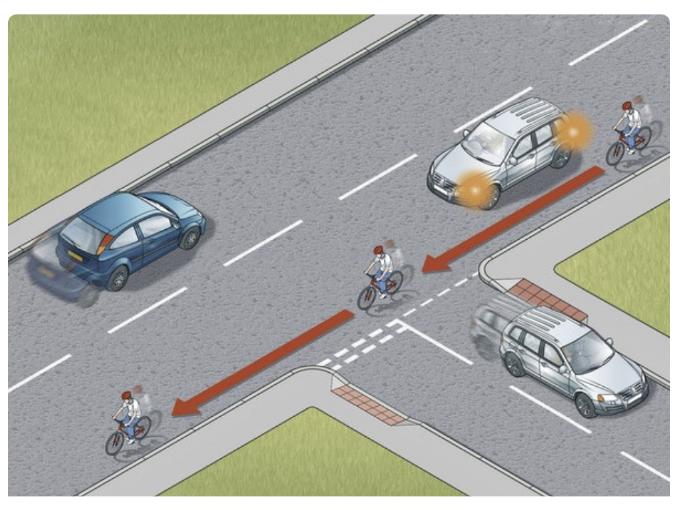
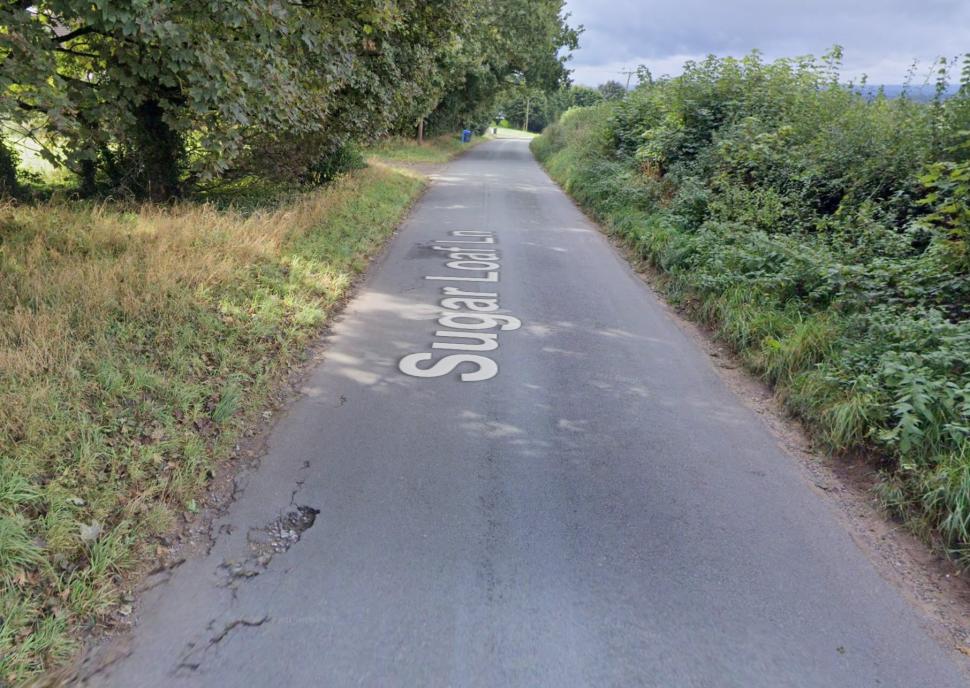
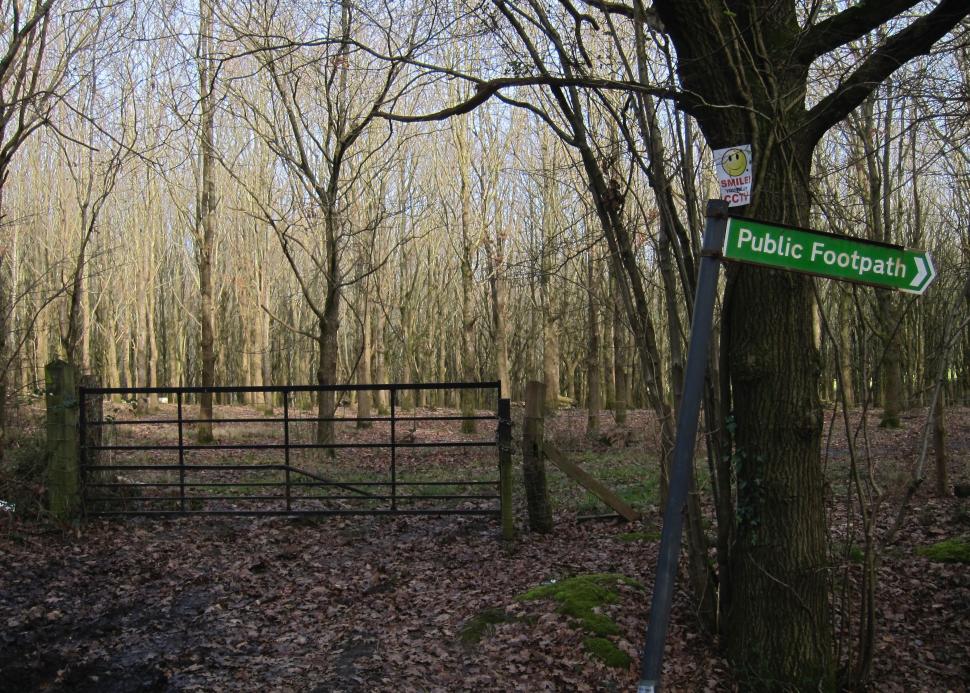
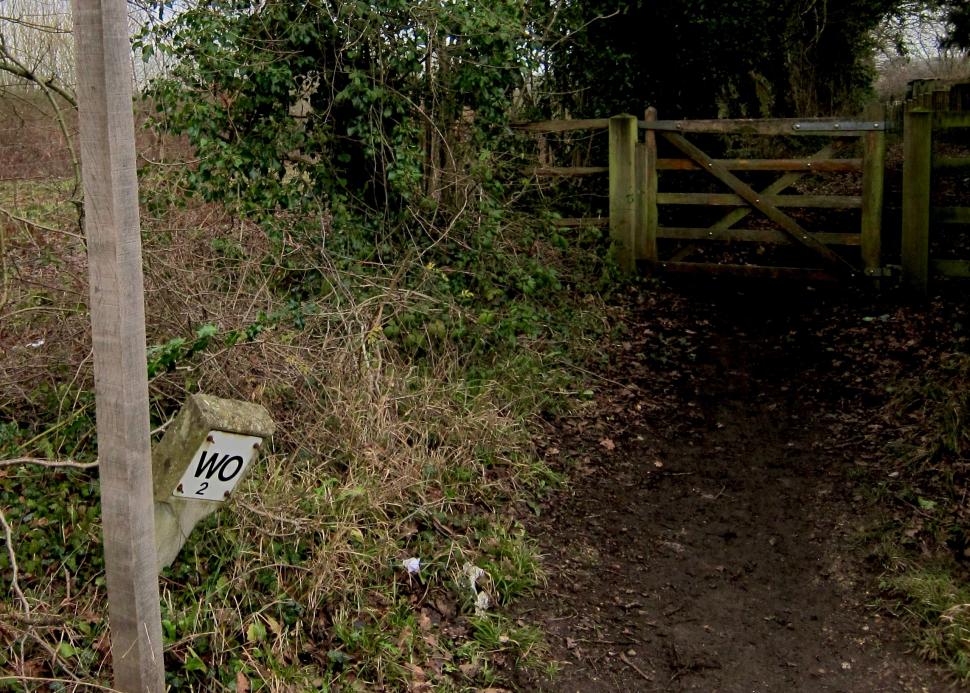

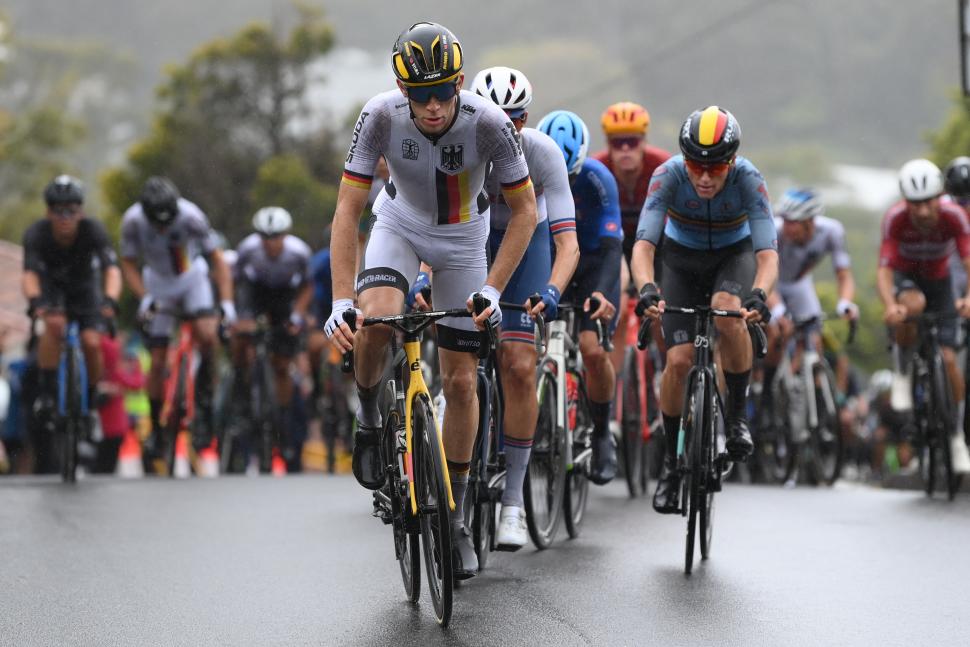
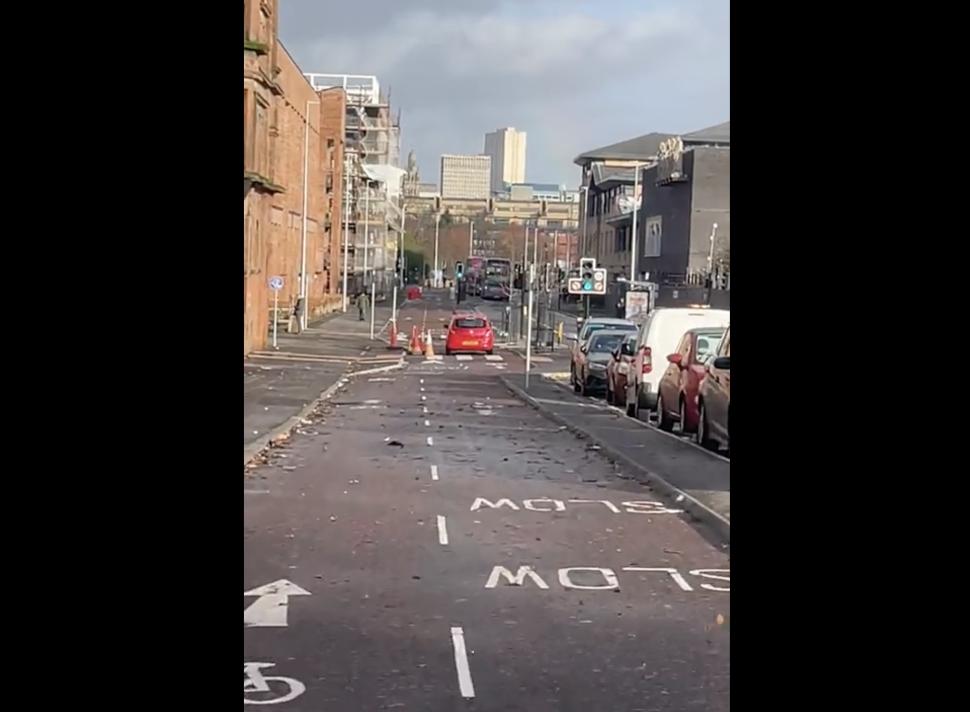
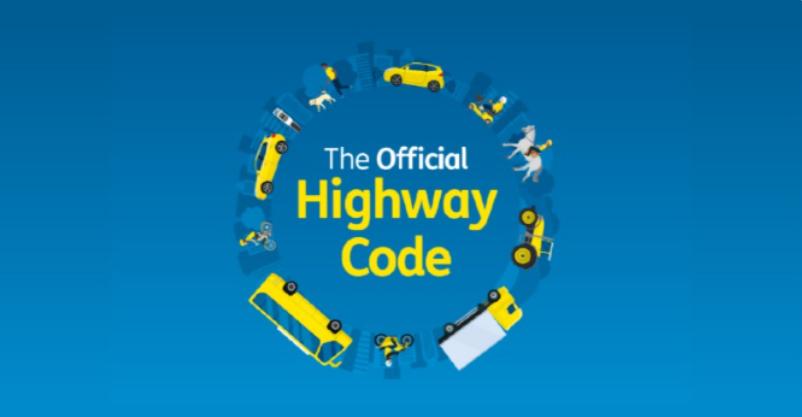

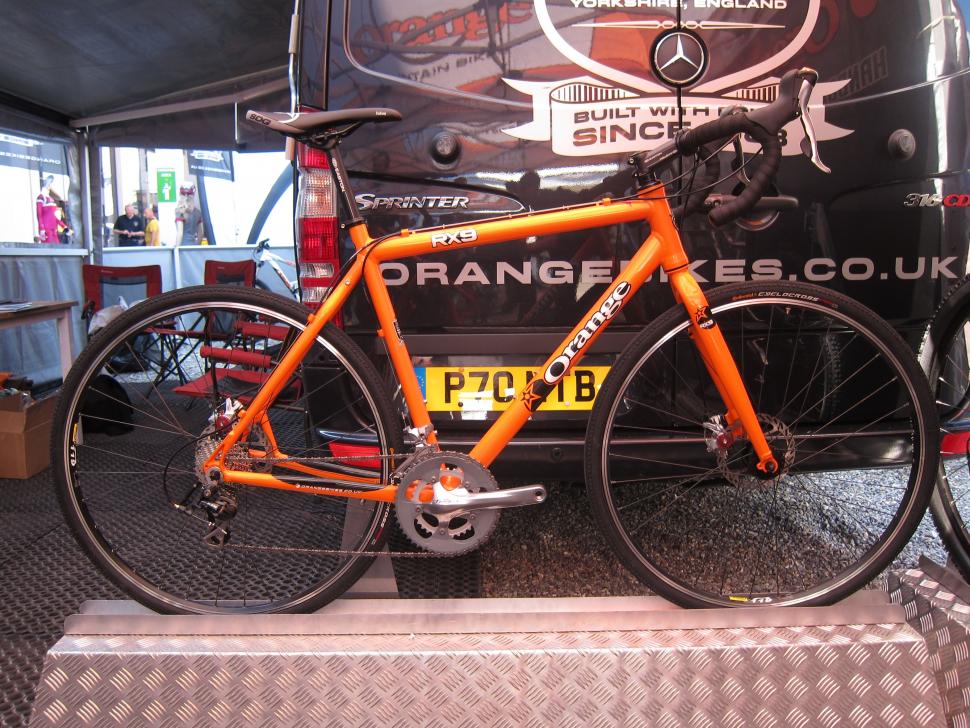
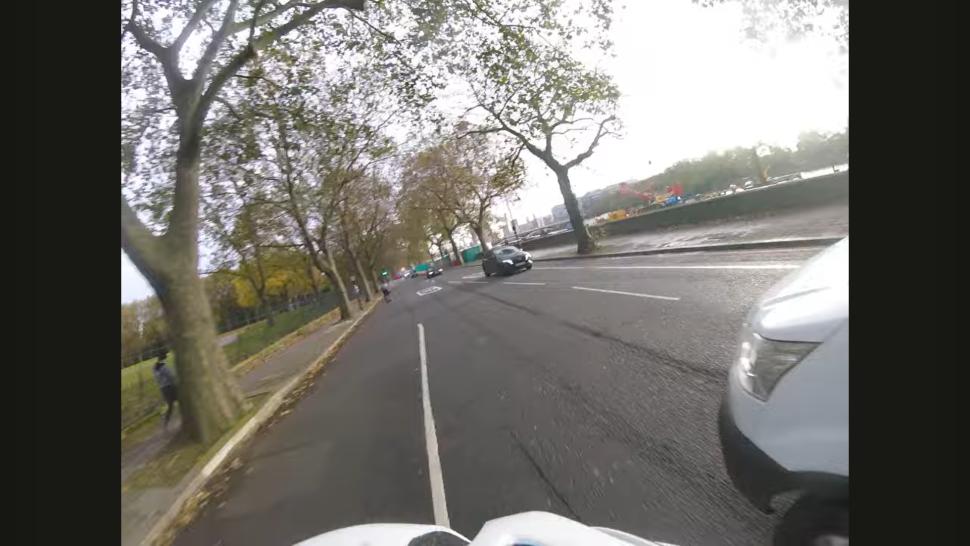

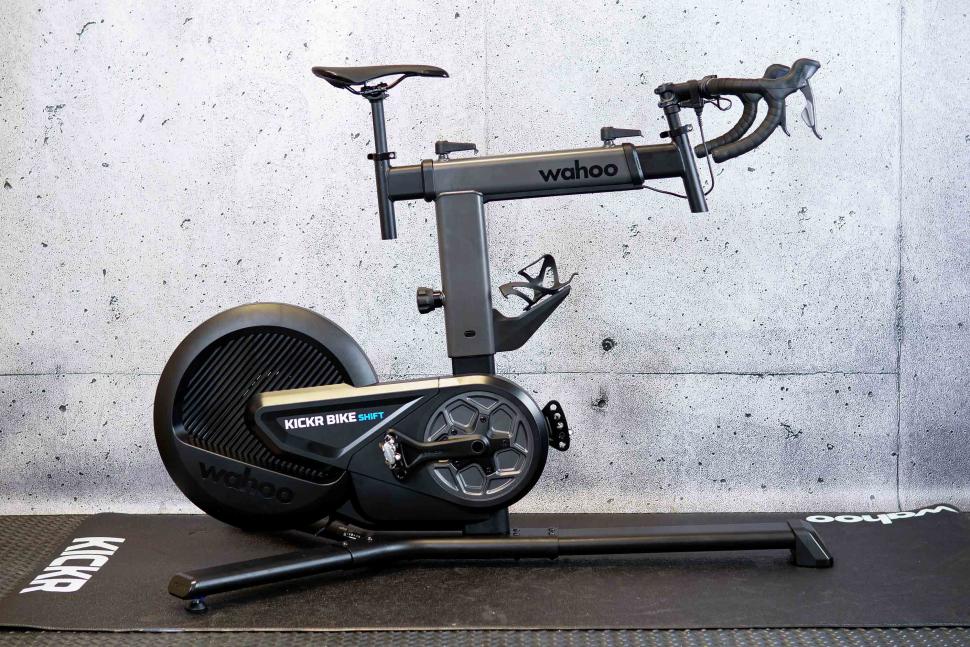


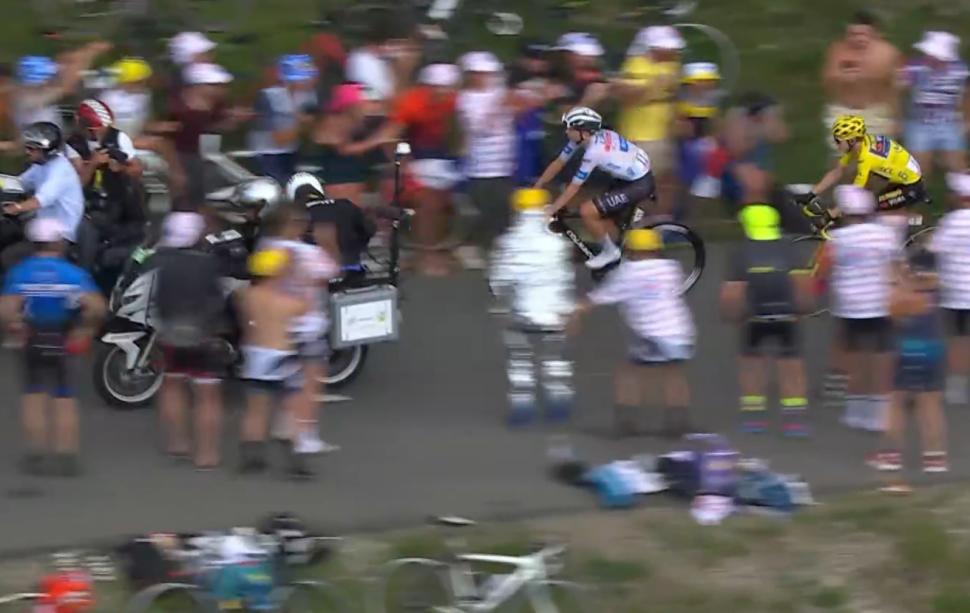
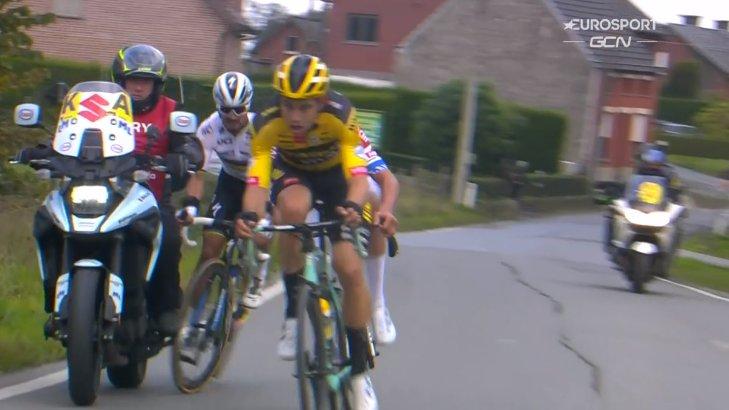
Add new comment
27 comments
The UK really, really needs to adopt the "Idaho stop'' on a national level to put an end to all th pissing and moaning about cyclists and red lights.
Would it though? Seems that having e.g. speed limits which don't apply to bikes and recently clarified guidance saying that it's perfectly fine for cyclists to ride side-by-side hasn't stopped complaints there? Nor has having a tax long called VED regularly explained in the meeja stopped complaints about "they don't pay road tax".
I'm equivocal on the actual policy in question - evidence seems to show it's not hurting cyclists. However I can see a generation of conflict with pedestrians.
If you really want to make cycling less likely to generate comment and conflict, more appealing AND safer you want this arrangement at traffic lights.
Well done to Craig Robertson for giving such a comprehensive response on the Police Scotland video. It's worth mentioning however that rule 66, in the latest version of the Highway Code, is more positive and encouraging about riding two abreast. It no longer says "never ride more than two-abreast, and ride in single file on narrow or busy roads and when riding round bends". It now says "You can ride two abreast and it can be safer to do so ...". Given the wording, riding even three abreast would not contravene the code.
People are surprised that the general public doesn't know about the updates to the Code? If I hadn't heard about it here I would know either. There hasn't exactly been much of a push has there?
You couldn't miss the unofficial promoting of this he updates. The taboids and various broadsheets were going out of their way in whipping their readership into a frenzy of indignation to the misinformation they were printing.
https://metro.co.uk/2024/01/27/elderly-driver-killed-two-women-ignoring-...
Banned for nine years and ten months? Since when would someone with an eye condition "so severe he would struggle to see the steering wheel" pass a medical exam to be fit to drive?
Licence should never be returned on medical grounds.
It says in the article that
Unfortunately, as has been covered on here many times before, the opticians and GP can tell him he shouldn't drive until they are blue in the face, but it is still up to him to voluntarily surrender his 'right to drive'
(well, until he kills someone, obviously…).
I see bans from driving as a punishment. We have a licensing authority to decide if a driver should ever get behind the wheel again. The truth is that the DVLA are negligent in their duty. When did we ever here about fines for the failure to advise them of medical conditions that actually get used in mitigation. There are so many conditions that should be reported and aren't. In this case it's clear that he should have surrendered his license but in many cases you should just disclose your condition and then the DVLA should monitor that condition by consulting your doctor. It just doesn't seem to happen that way.
I wish bans from driving were not seen as a punishment! Making this more "administrative" might help make this less "drama" - although this relies on a level of enforcement and ultimately public unacceptability of driving while unlicenced / uninsured which doesn't currently exist in the UK...
So it should be "we've assessed that you cannot carry out this activity safely so you are no longer licenced to do so." In some cases that would go continue as "You've done something so egregious it seems clear you will never be cut out for this level of responsibility - any applications to do so will be declined". (I also think you should always have to pass some kind of re-test / have a probation period. Perhaps that could be tailored to the level of incompetence / disrespect you have on record rather than just "add 30 minutes" or whatever we have now?)
I should expect a few anti police Scotland comments from cyclists. "You only give a shit about cyclists on Facebook but not in real life".
Haven't I already done that?
I can't quite remember....
Some drivers seem to think that that is the pact they've made - that they are entitled to be a menace on the roads because they've paid a hypothecated tax for using them - and therefore cyclists should be required to make the same deal.
"More Highway Code news: RAC research suggests half of drivers still unsure if Highway Code changes have made roads any safer for pedestrians."
Spoiler alert - they haven't.
There are still a lot of motorists who do not fully understand the Code changes, And there are others who know the changes but ignore them. This makes situations more dangerous, especially when motorist-motorist engangement causes friction when one tries to follow the rules, but the other acts in a way that prevents them from doing so safely.
I do try to stick to the new rules when driving but I have on multiple occasions been forced to ignore waiting pedestrians at junctions (turning off from the primary carriageway) turning left/exiting a roundabout because I am either being tailgated or approached from behind at speed, or being flashed by another driver letting me turn right.
There are also instances of pedestrians continuing hazardous behaviour by either not being aware of their surroundings, or trying to force their way across despite their vulnerability.
Generally speaking, the biggest issue is the fact that motorist error is still the biggest risk factor in all situations. The fact that there is a sense of entitlement from motorists, and a large scale issue of casual speeding, mobile phone use, signal and Traffic Order infringements and other motoring infractions speaks volumes to this. There needs to be more robust deterrent for motoring offences that do not result in an RTC.
It's getting to the point where safe and responsible drivers are viewed as a hazard to other motorists because everyone expects other drivers to break the law. That does not bode well for all other vulnerable road users and the safety advocacy groups that support them.
Couldn't agree more. The amount of times I've nearly been rear ended whilst driving, exiting roundabouts and giving way to pedestrians crossing. I'll admit as much as I want to adhere to it whilst cycling I find the same situation too dangerous...I do try to apologise to the pedestrians.
Also as a pedestrian, usually with kids in tow, I certainly aren't going to put ourselves at risk by expecting motorists to give way to us crossing, again as much as I want to.
I can't understand why there hasn't been some national campaign emphasising the need to expect pedestrians to be crossing on roundabout exits/when turning into juctions etc.. because it is the high majority that don't acknowledge it, as well as the usual ones who really don't care.
Indeed - perhaps yet more guidance required on how to safely drive to the conditions when those include "large numbers not driving carefully and expecting you not to either". (The practical advice to cyclists remains the same of course - "It's your funeral - just don't expect others to be looking out for you. Beware a few looking to teach you a lesson.")
Even motorists who stick to speed limits try to be at the speed limit for as much time as possible, even if it is safer (and probably necessary) to go slower.
I had this discussion with a colleague when delivering some heavy equipment in a van - we were on a 40mph road and there was a sharp bend we had to take at about 20mph at most. His response was "Why have a 40 speed limit when you can't safely do that speed on this corner?"
My response was as follows:
1. It would be stupid and costly and unneccessary to reduce the speed limit for a 50 metre stretch of road only to return back to the higher speed limit immediately after.
2. The speed limit is only a maximum indicated safe speed overall. In perfect conditions you will be able to safely travel along most of the road at that designated speed, however it is a driver's responsibility to reduce speeds when either visibility or stopping potential is reduced, or when hazards are present, be it temporary (i.e. higher traffic volumes, parked cars, pedestrians in the road etc) or permanent fixtures (lane narrowings, road furniture, sharp bends etc).
With his logic, why do racing drivers adjust their speed on bends/turns etc?
Why don't they just drive with their foot down all the time?
The difference between Scarelectrix and TCR.
I don't even understand why anyone is being surveyed to ask if they believe the new rules make pedestrians safer. Surely looking at the statistics is the way to answer the question.
We don't survey motorists to ask if they think airbags, crumple zones, or anti-lock brakes make drivers safer.
"Record high costs of car insurance could tempt more young people to commit fraud, the industry has said."
https://www.bbc.co.uk/news/business-68016631
"It's either driving without insurance and risk ruining my future or going to work at 6am in the freezing cold with a bicycle."
Stefan said he would be buying a bike.
Well done that lad !
Little does he know that the chances of him getting caught are slim and the punishments are a joke. I'm sure his mates will let him know.
My neighbour's son is 17, but they can't afford driving lessons. So they go out at 10 pm instead, when it's less likely they will have an "accident"...
It's maddening. It's been just under 10 years since I passed my test, and I remember vividly looking at insurance.
For a 9 year old 1 litre hatchback (bought for £4000, was RRP £12,999 when new) I had quotes ranging from £1,500 to £3000 for black box quotes from young driver specialists, but then I scrolled down to the bottom on the comparison website.
A luxury car insurance specialist, instead of refusing to offer a quote, had a figure of £15,000. Yes, FIFTEEN. Ten times my cheapest quote and more than the value of the car brand new. The brand new version of the same car was only £14k.
The fact that base premiums have doubled in ten years is shocking. But the fact that the infrastructure and lifestyle forces everyone into this rabbit hole is even worse.
Active travel schemes and public transport should be good enough that this should not be seen as necessary, it would stop insurers fleecing everyone as we would all sell off our cars and cancel our our policies if they weren't being fair.
That's not how insurance works.
Have a little think about the amount of damage you can do to others.
I'm not comparing my current quote with new drivers. I know that premium rates vary on a risk levied basis, hence I am paying little over a third of my first premium on a bigger and more expensive car (albeit not by a huge amount) having made no claims against insurers nor have I any penalty points on my licence.
As a new driver my first premium for my first car was £1500.
New drivers in 2024 face premiums at £3000 minimum.
That is a 100% increase in premium costs.
In 2015 a 9 year old small hatchback (1 litre 50hp) with low milage was between £4000 and £6000 (make model and condition dependent)
Now, in 2024, the price is around £6000 to £8000. That is a 50% increase in the cost of a vehicle.
Fuel has gone up 40 to 50% in that time, as has most other running costs.
So (rhetorically) why the fuck has insurance inflation increased at double the rate of vehicle value and running costs?
Anecdotally, I got my first premium quote through a comparison website. I looked at the most expensive quote out of curiosity. The £15k quote was an insurance company that are aimed at owners of Aston Martins, Bentleys, Lambourghinis etc. I am clearly not their demographic so there was no point in even having the offer in the first place, yet there was still an offer on the comparison site.
But a car-centric infrasturcture that is present in the UK means that you are effectively bullied into using a car as a requirement to function in society, meaning that you are effectively forced into the bottomless money pit associated with motoring. I agree with car insurance being compulsory but because they know that people rely on their cars, both combined means that underwriters have no incentive to enter price wars, and inflate prices at rates as big as they can get away with.
If there was a good quality comprehensive system of public transport and active travel infrastructure, many people (probably including myself) would forego car ownership as it is unneccesary. It would be cheaper to hire a car for the 2 weeks worth of times where it may be unavoidable than own it. Then insurers would be incentivised to price more fairly because they are no longer in demand. There would still be a sliding scale of risk cost but they wouldn't rip people off to the brink of choosing lawlessness.
I recall one of my drivers saying that he loved closed road racing because he got to drive at speeds, otherwise illegal, on roads he knew well. Adrenaline is not always your friend.
My more regular rider, on the other hand, was vastly experienced and I had the confidence to let him get on and ride, safe in the knowledge that if I asked him to do something risky, he wouldn't.
Race organisers need to have a long hard chat with themselves to see how thye could have prevented this from happening.